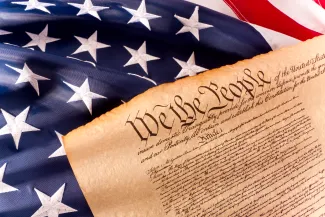
Study reveals shifting American views on free speech amid Israel-Hamas war
Click play to listen to this article.
(Tennessee News Service) A recent study by Vanderbilt University found that Americans generally love free speech, but their views change occasionally. One instance of this occurred during the protests at U.S. universities about the Israel-Hamas war.
John Geer, professor of political science at Vanderbilt University, said the study replicated a 1939 poll that asked about free speech's role in a democracy and people's commitment to free speech. That study involved 3,500 participants. However, in June, only 1,000 Americans were surveyed to compare their current views to those in the past.

"We were interested to see if, in fact, all those protests, for example, it led people lessen or increase their commitment to free speech. And you could imagine hypotheses in both directions," Geer said.
Polling found that most Americans believe in unrestricted free speech, allowing any topic or speaker. However, there's a significant partisan divide, with Republicans more likely than Democrats to oppose any restrictions.
Jacob Mchangama, executive director for The Future of Free Speech and research professor at Vanderbilt University said Americans generally support free speech in abstract terms, but their views become more nuanced when confronted with specific hot-button topics on issues of transgender, gay marriage and abortion. He added there are also different degrees of tolerance for leaders of Israel and Hamas speaking on college campuses.
"If you ask whether a white supremacist should be allowed to speak on college campuses, only 37 percent say yes. A supporter of critical race theory, you get a majority, a significant majority of 66 percent, but that's still quite a few Americans who believe that someone who supports critical race theory should not be allowed to speak on college campuses," he explained.
Mchangama added that tolerance for opposing ideas is crucial for free speech, and the survey provides valuable data on this civic commitment. While most people support free speech, a significant minority would not tolerate opposing views, even when they are nonviolent and protected by the First Amendment.

















